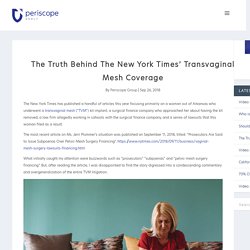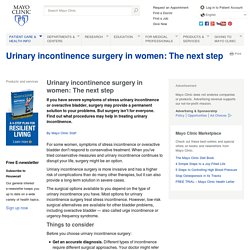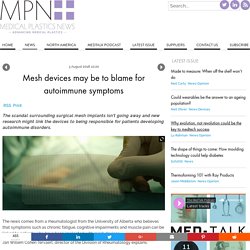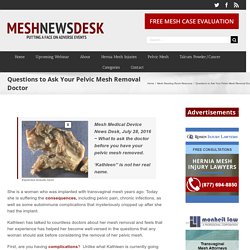

The Truth Behind The New York Times' Transvaginal Mesh Coverage. The New York Times has published a handful of articles this year focusing primarily on a woman out of Arkansas who underwent a transvaginal mesh (“TVM”) kit implant, a surgical finance company who approached her about having the kit removed, a law firm allegedly working in cahoots with the surgical finance company, and a series of lawsuits that this woman filed as a result.

The most recent article on Ms. Jerri Plummer’s situation was published on September 11, 2018, titled: “Prosecutors Are Said to Issue Subpoenas Over Pelvic-Mesh Surgery Financing”. What initially caught my attention were buzzwords such as “prosecutors” “subpoenas” and “pelvic-mesh surgery financing.” But, after reading the article, I was disappointed to find the story digressed into a condescending commentary and overgeneralization of the entire TVM litigation.
I highly doubt that the majority of women who have undergone a TVM implant were told the following by their implanting doctor prior to surgery: What makes Ms. Ariana L. Smith, MD profile. Selected Publications: Lamin E, Parrillo LM, Newman DK, Smith AL.: Pelvic floor muscle training: Under-utilization in the United States.

Current Urology Reports : 2016. Jay L. Bloch, MD profile. New Jersey court upholds $11 million verdict in state's first pelvic mesh case. Pelvic mesh, or trans-vaginal mesh, the controversial medical device made famous by those late-night infomercials that personal injury attorneys use to seek victims, is slowly facing its day in court, or thousands of days to be exact.

Tens of thousands of lawsuits have been filed against device makers like Johnson & Johnson’s subsidiary Ethicon over mesh products. The suits describe horrific side effects patients say they experienced from the implant. Cases stalled in two courts So many cases concerning mesh have been filed that the courts have consolidated thousands of the complaints in two courts, one in West Virginia and another in New Jersey under a system called Multi-District Litigation. But rather than more efficiently manage the case load, plaintiffs and personal injury attorneys complain that the consolidation has only caused the cases to drag slowly along. Because the product was designed to be a permanent implant, there is no simple way to remove it. Jury's verdict stands. Searching for Docs Experienced with FULL Mesh Removal, and/or NON-Mesh Repairs – Mesh Me Not. I’ve been posting the below plea for help everywhere… on any public Facebook pages that will allow it and are related to health care, specifically GYN/URO.

Maybe, some will respond rather than delete. This is what I’ve been posting: ========= Hello. Finding the Right Doctor for Surgical Mesh Complications – Mesh Me Not. SURGEON LIST - List of doctors who remove transvaginal mesh (USA) Alan L. Schuricht, MD, FACS profile. Mesh Removal - Urinary incontinence surgery in women: The next step. Urinary incontinence surgery in women: The next step If you have severe symptoms of stress urinary incontinence or overactive bladder, surgery may provide a permanent solution to your problems.

But surgery isn't for everyone. Find out what procedures may help in treating urinary incontinence. By Mayo Clinic Staff For some women, symptoms of stress incontinence or overactive bladder don't respond to conservative treatment. Urinary incontinence surgery is more invasive and has a higher risk of complications than do many other therapies, but it can also provide a long-term solution in severe cases. The surgical options available to you depend on the type of urinary incontinence you have. Things to consider Before you choose urinary incontinence surgery: Get an accurate diagnosis. Understand the risks Like any surgery, urinary incontinence surgery comes with risks. Talk with your doctor to understand possible risks and benefits of surgery. Sling procedures to treat stress incontinence Retropubic. Various Complications & Treatments. The most serious complications after hernia mesh surgery can be deadly.

At the very least, they can cause severe pain. They almost always need revision surgery to correct. The most serious complications of hernia mesh are also some of the most common. Hernia mesh complications include adhesion, bowel obstruction or perforation, infection, rejection and migration. More than 90 percent of the 1-million-plus hernia surgeries performed every year in the U.S. rely on hernia mesh for repairs. Nearly one-third of people who undergo hernia surgeries experience some sort of complication, with excessive pain being the most frequent complaint, according to one study. Hernia Mesh Adhesion The U.S. Laparoscopic Removal of Pubovaginal Polypropylene Tension-Free Tape Slings. Mesh devices may be to blame for autoimmune symptoms. The scandal surrounding surgical mesh implants isn’t going away and new research might link the devices to being responsible for patients developing autoimmune disorders.

The news comes from a rheumatologist from the University of Alberta who believes that symptoms such as chronic fatigue, cognitive impairments and muscle pain can be linked to patients who have been implanted with mesh devices. Jan Willem Cohen Tervaert, director of the Division of Rheumatology explains. “In my practice, I studied 40 patients who had mesh implants and found that almost all of them had symptoms such as chronic fatigue, cognitive impairment known as “brain fog,” muscle and joint pain “fibromyalgia,” feverish temperature, and dry eyes and dry mouth,” Tervaert said. “Of those patients, 45% developed an autoimmune disorder such as lupus or rheumatoid arthritis.
And in the patients who had allergies before the implant, they were significantly worse after.” Unfortunately, it isn’t easy to remove mesh implants. Questions to Ask Your Pelvic Mesh Removal Doctor. Explanted Avaulta meshMesh Medical Device News Desk, July 28, 2016 ~ What to ask the doctor before you have your pelvic mesh removed.

‘Kathleen” is not her real name. She is a woman who was implanted with transvaginal mesh years ago. Today she is suffering the consequences, including pelvic pain, chronic infections, as well as some autoimmune complications that mysteriously cropped up after she had the implant. Kathleen has talked to countless doctors about her mesh removal and feels that her experience has helped her become well-versed in the questions that any woman should ask before considering the removal of her pelvic mesh.
First, are you having complications? Some percentage of women have complications initially, but that number is unknown because no one is tracking the big picture. A surgical nick to the bladder is not uncommon and will eventually heal, but an injury to the colon during the placement of a mesh in the posterior pelvis may not heal. Bruce Rosenberg Column: Hernia Mesh Help Here. Mesh Medical Device News Desk, August 23, 2018 ~ As many readers already know, polypropylene (PP) is the plastic polymer component that goes into making up most meshes, whether used in the pelvic region for prolapse and incontinence or used to make hernia mesh.
